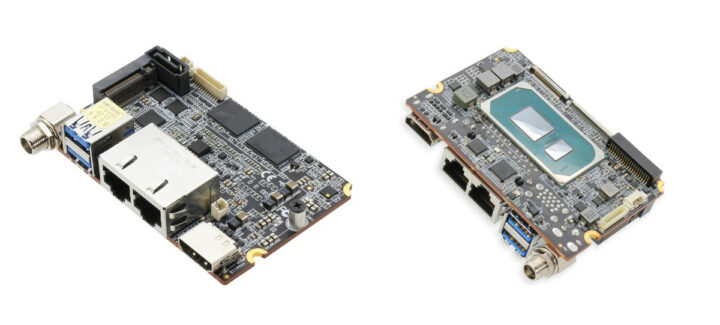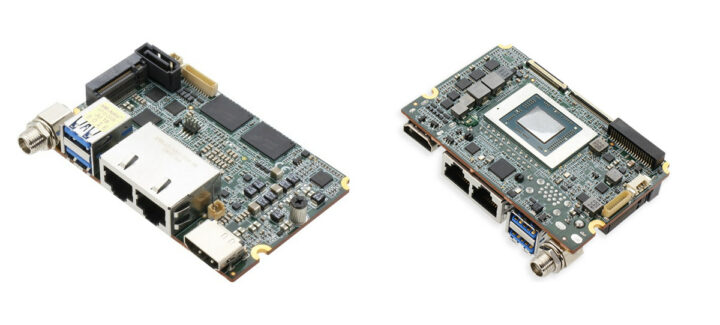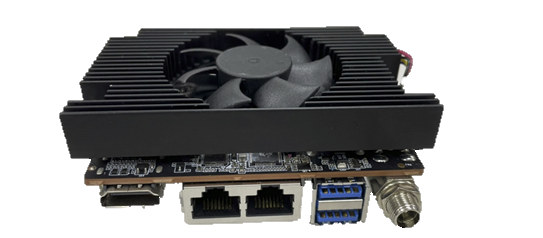We’ve recently reviewed the UP 4000 SBC as a more powerful x86 alternative to Raspberry Pi 4, but if it still does not cut it, AAEON de next-TGU8 or de next-V2K8 should, as the business card-sized single board computers (SBC) are equipped with respectively an Intel Tiger Lake processor up to a Core i7-1185G7E, and an AMD Ryzen Embedded V2000 SoC up to Ryzen Embedded V2516.
But the comparison stops at the size, as both SBCs offer sets of features different from the usual Raspberry Pi form factor with notably up to 16GB RAM, SATA and NVMe storage, dual Ethernet (1x 2.5GbE, 1x Gigabit Ethernet), dual 4K display output via HDMI and eDP, some USB 3.2 ports, as well as serial and I/O interfaces via headers.

de next-TGU8/V2K8 SBC specifications:
- SoC
- de next-TGU8
- Intel Core i7-1185G7E quad-core/octa-thread processor @ 1.80GHz / 4.40GHz with Intel UHD graphics; TDP: 15W (TPD up: 28W)
- Intel Core i5-1145G7E quad-core/octa-thread processor @ 1.50GHz / 4.10GHz with Intel UHD graphics; TDP: 15W (TPD up: 28W)
- Intel Core i3-1115G4E dual-core/quad-thread processor @ 2.20GHz / 3.90GHz with Intel UHD graphics; TDP: 15W (TPD up: 28W)
- de next-V2K8
- AMD Ryzen Embedded V2718 octa-core/16-thread processor @ 1.7 GHz / 4.15 GHz (Turbo) with 4MB L2 cache, 7CUs Radeon RX Vega 7 GPU @ 1.6 GHz; TDP: 15W (TDP up 25W)
- AMD Ryzen Embedded V2516 hexa-core/12-thread processor @ 2.1 GHz / 3.95 GHz (Turbo) with 3MB L2 cache, 6 CUs Radeon RX Vega 6 GPU @ 1.5 GHz; TDP: 15W (TDP up 25W)
- de next-TGU8
- System Memory – Up to 16GB LPDDR4x, 3733MT/s
- Storage – SATA III port, M.2 socket for NVMe SSD (See Expansion section)
- Display
- HDMI 1.4b up to 4Kp30
- eDP up to 3840×2160 resolution
- Up to 2 independent displays
- Networking
- 2.5GbE RJ45 port via Intel i225LM controller
- Gigabit Ethernet RJ45 port via Intel i219LM (Tiger Lake) or Realtek RTL8111H (AMD Ryzen) controller
- USB – 2x USB 3.2 Gen 2 x2 Type-A ports, 4x USB 2.0 interfaces via header
- Serial – 2x RS232/422/485 via header
- Expansion
- M2 M-Key 2280 socket (PCIe x2, PCIe x4 Gen3 (by FPC))
- 8-bit GPIO header
- optional SMBus/I2C
- Security – fTPM
- Misc – UEFI BIOS with WoL, watchdog timer, RTC + battery (3V/240mAh), smart fan header, HDD LED, PWR LED, Power Button, Buzzer, Reset
- Power Supply – +12V DC via lockable DC jack, AT/ATX type
- Power Consumption
- Core i7-1185G7E + LPDDR4x 16GB : 12V @ 7A, 84W (Peak during full loading)
- Core i7-1185G7E + LPDDR4x 16GB : 12V @ 4.58A, 55W (steady state during full loading )
- No numbers for the AMD Ryzen models yet.
- Dimensions – 86 x 55mm
- Temperature Range – Operating: 0°C to 60°C, storage: -40°C to 80°C
- Humidity – 0% ~ 90% relative humidity, non-condensing
- EMC – CE/FCC Class A

AAEON does not directly list supported operating systems but provides drivers for Windows 10 64-bit for both platforms as well as Ubuntu 22.04 drivers for the AMD board, and Ubuntu 20.04 drivers for the Intel Tiger Lake SBC.
Target applications are expected to include edge AI computing, robotics, UAVs/drones, and smart transport. Cooling will be challenging for a 15W processor on such as small board, and as one should have expected there’s a large heatsink with a fan to make sure the system works optimally under most conditions.
Performance would have to be tested in detail, but for reference, you may check out UP Xtreme i11 review with an Intel Core i7-1185GRE processor that is similar to the Core i7-1185G7E used in the de next-TGU8 SBC. When I first read “de enext”, I thought it was a play on “The”, but the company says the meaning is “of/from “ in Spanish, and “de next” stands for the next generation IPC (industrial PC).
The de next-TGU8 sells for $1,000 to $1,500 depending on the selected configuration, while the de next-V2K8 goes for $1,150 to $1,350 when the models with AMD Ryzen Embedded V2516 and V2718 respectively. Both business card-sized Tiger Lake/AMD V2000 SBC’s can be found on AAEON’s eShop. Additional information may be found on de next-TGU8 and de next-V2K8 product pages.
Updated: We initially wrote about the boards on July 23, 2022, and updated the article once the boards become available for sale.

Jean-Luc started CNX Software in 2010 as a part-time endeavor, before quitting his job as a software engineering manager, and starting to write daily news, and reviews full time later in 2011.
Support CNX Software! Donate via cryptocurrencies, become a Patron on Patreon, or purchase goods on Amazon or Aliexpress





